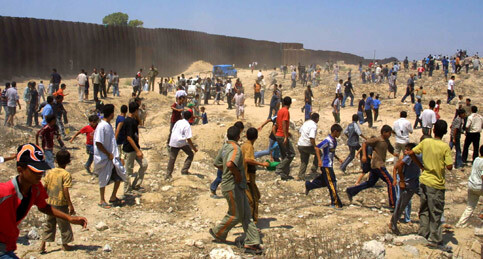B'Tselem 30 August 2006

Palestinians attempt to create another passage in the wall between Egypt and Rafah, southern Gaza Strip, 24 August 2006. (MaanImages/Hatem Omar)
On 30 August 2006, B’Tselem wrote to the Defense Minister, Amir Peretz, and informed him there was reason to believe that the security establishment has been using the Rafah crossing to put pressure on Palestinians in the Gaza Strip. The organization demanded that the minister order the IDF to cease its illegal policy.
B’Tselem’s action followed publication of the minutes of a meeting held in the Ministry of Defense relating to the Gaza crossings, as reported in Ha’aretz. According to the report, the IDF’s Planning Division argued that the crossing “should be opened on occasion only after the kidnapped soldier is released and the shooting from the Gaza Strip stops. (To use the crossing as a means of applying pressure).” The General Security Service opposed opening the crossing even for a few hours, (so long as the matter of the abducted soldier remains unchanged. Pressure on this matter must remain in place at this stage).” The representative of the Coordinator of Government Operations in the Territories also believed that the crossing should remain closed until Shalit is released.
According to OCHA’s [the United Nations Office for the Coordination of Humanitarian Affairs] reports for July-August 2006, the Rafah crossing has been closed to traffic since 25 June 2006. On 18-19 July, it was opened to allow the crossing of 5,178 Palestinian who had been stuck on the Egyptian side of the crossing. On 10, 11, and 19 August, Israel allowed limited movement through the crossing.
Rafah Crossing is the sole exit point for Gazans who want to go abroad. Closing the crossing results in an almost complete siege of the Gaza Strip, during which nobody enters or leaves. In addition to the extensive harm it causes to Gazans who are unable to go abroad to receive medical treatment, to study, of for any other purpose, the closing of the crossing also prevents the return of Palestinians who had gone abroad, requiring many of them to remain for a prolonged period of time on the Egyptian side of the border in harsh conditions.
According to the “crossings agreement,” of November 2005, Egypt , the Palestinian Authority, and European observers are responsible for operating the crossing. However, Israel controls the observers’ access to the crossing: the observers live in Ashkelon, and to get to work, they have to pass through the Kerem Shalom crossing, which Israel often closes on the grounds that it received information of planned terrorist attacks.
The newspaper report raises the grave suspicion that Israel ‘s claim of concrete warnings of terrorist attacks is a cover-up for its policy of pressuring the Palestinians to obtain the release of the abducted soldier, Cpl. Gilad Shalit, and stop the Qassam rocket fire into its territory. If this is the case, Israel’s action constitutes collective punishment of the civilian population in the Gaza Strip, in violation of international humanitarian law. Article 33 of the Fourth Geneva Convention is clear: “Collective penalties and likewise all measures of intimidation or of terrorism are prohibited.” The article also states that, “Reprisals against protected persons and their property are prohibited.”
Related Links